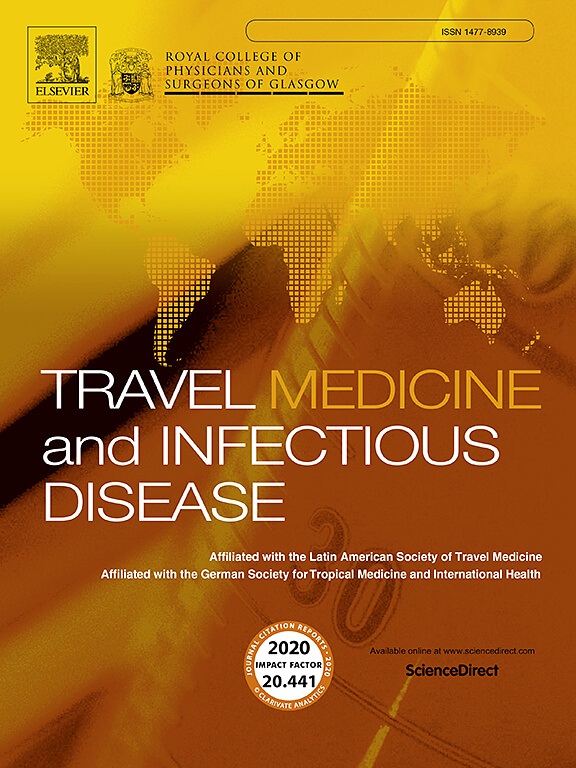Travellers’ adherence to atovaquone/proguanil malaria chemoprophylaxis after return from endemic areas
IF 4.7
3区 医学
Q1 INFECTIOUS DISEASES
引用次数: 0
Abstract
Background
According to current guidelines, atovaquone/proguanil (AP) malaria chemoprophylaxis is taken once daily during travel, and continued for seven days after return from malaria-endemic areas. However, pharmacokinetic data and studies on drug-sparing AP regimens suggest that AP could possibly be discontinued upon return without loss of protection. Besides being more cost-effective, shorter AP regimens may enhance adherence. We aimed to investigate adherence to the current AP chemoprophylaxis regimen during the seven days post-travel, and travellers’ preferences for potential drug-sparing AP regimens.
Methods
In this cross-sectional study, adult travellers, who were prescribed AP chemoprophylaxis during a pre-travel consultation between 01-12-2022 and 01-12-2023 at the Amsterdam UMC travel clinic, were send a post-travel online questionnaire. The primary outcome was the proportion of travellers non-adherent to AP during the seven days post-travel, defined as missing one tablet or more. Secondary outcomes were non-adherence during travel, reasons for non-adherence, and AP regimen preferences.
Results
The questionnaire was completed by 62 % (382/614) of contacted travellers. Of the participants, 31 % (117/382) reported non-adherence during the seven days post-travel; during stay this was 16 % (58/382). Frequently reported reasons for non-adherence were: forgetfulness, low self-perceived malaria risk, and adverse effects. An alternative AP regimen discontinuing AP upon return was deemed most appealing and easy to adhere by 73 % (276/376) of participants.
Conclusions
Non-adherence was high during the seven days after return. Travellers preferred an alternative AP chemoprophylaxis regimen, allowing them to discontinue upon return. Future research shall be conducted to investigate whether AP could be discontinued upon return.
旅行者从流行地区返回后对阿托伐酮/氯胍疟疾化学预防的依从性。
背景:根据现行指南,旅行期间每天服用一次阿托伐酮/丙胍(AP)疟疾化学预防,并在从疟疾流行地区返回后持续7天。然而,药代动力学数据和药物节约AP方案的研究表明,AP可能在返回后停止使用而不会失去保护作用。除了更具成本效益外,较短的AP方案可能会提高依从性。我们的目的是调查旅行后7天内对当前AP化学预防方案的依从性,以及旅行者对潜在的节省药物的AP方案的偏好。方法:在这项横断面研究中,于2022年1月12日至2023年1月12日期间在阿姆斯特丹UMC旅行诊所旅行前咨询并开具AP化学预防处方的成年旅行者,在旅行后发送在线问卷。主要结果是旅行者在旅行后7天内不遵守AP的比例,定义为丢失一片或更多片。次要结果是旅行期间不依从性、不依从性的原因和AP方案偏好。结果:62%(382/614)的受访旅客完成了问卷调查。在参与者中,31%(117/382)报告在旅行后7天内没有遵守规定;住院期间,这一比例为16%(58/382)。经常报告的不遵守规定的原因是:健忘、自我认知的疟疾风险低和不良反应。73%(276/376)的参与者认为,返回后停用AP的替代方案最具吸引力,且易于坚持。结论:术后7天不依从性较高。旅行者更喜欢另一种AP化学预防方案,允许他们在返回时停止使用。AP是否可以在回归后停用,需要进一步的研究。
本文章由计算机程序翻译,如有差异,请以英文原文为准。
求助全文
约1分钟内获得全文
求助全文
来源期刊

Travel Medicine and Infectious Disease
PUBLIC, ENVIRONMENTAL & OCCUPATIONAL HEALTH-INFECTIOUS DISEASES
CiteScore
19.40
自引率
1.70%
发文量
211
审稿时长
49 days
期刊介绍:
Travel Medicine and Infectious Disease
Publication Scope:
Publishes original papers, reviews, and consensus papers
Primary theme: infectious disease in the context of travel medicine
Focus Areas:
Epidemiology and surveillance of travel-related illness
Prevention and treatment of travel-associated infections
Malaria prevention and treatment
Travellers' diarrhoea
Infections associated with mass gatherings
Migration-related infections
Vaccines and vaccine-preventable disease
Global policy/regulations for disease prevention and control
Practical clinical issues for travel and tropical medicine practitioners
Coverage:
Addresses areas of controversy and debate in travel medicine
Aims to inform guidelines and policy pertinent to travel medicine and the prevention of infectious disease
Publication Features:
Offers a fast peer-review process
Provides early online publication of accepted manuscripts
Aims to publish cutting-edge papers
 求助内容:
求助内容: 应助结果提醒方式:
应助结果提醒方式:


